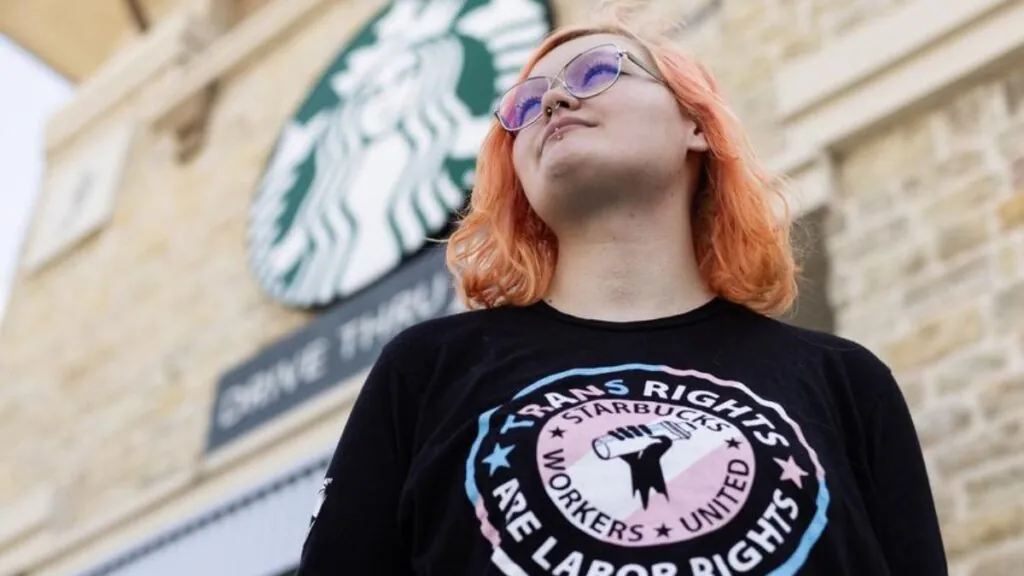Soleil Baker discovered around a year ago that their teammates were not working enough hours. Many of them struggled to pay rent and grocery bills.
Baker determined that it was time to take action.
“I just wanted everyone to be able to afford to live,” they told me.
A barista at Starbucks in this little North Texas town, roughly 15 miles northwest of Dallas-Fort Worth International Airport, contacted Starbucks Workers United, the national union for Starbucks employees, and inquired about how to form a union.
Two months later, after gathering enough signatures to compel a ballot, Baker and around 20 other employees founded a union.
They were among the 68,000 Texans that joined a union in 2023, an increase from 2022. Employees in the technological and nonprofit sectors, along with coffee shops, drove this increase.
Texas has approximately 586,000 union workers, which is a small percentage of the millions of people who work here. Nonetheless, the surge is somewhat surprising considering the state’s lengthy history of antagonism against unions. Union membership dropped across the country at the same time.
Texas is one of 26 “right-to-work” states. Texas lawmakers initially enacted the statute in 1993. The law gives workers the choice of not paying union dues and the opportunity to work in a unionized company without being a member of the union itself. More recently, the Republican-controlled Legislature approved legislation aimed at preventing local governments from establishing progressive labor protections and regulations.
The National Republican Party, however, has taken a different tone from the top.
At the Republican National Convention in Milwaukee, Teamster President Sean O’Brien addressed an audience known for backing pro-business policies. In the speech, he emphasized the benefits of unions. Ohio Senator JD Vance, former President Donald Trump’s new running mate, aimed to appeal to working-class voters by citing his Midwestern heritage.
“We need a leader who is not in the pockets of big business but answers to the working man,” Vance stated during his speech.
Baker is skeptical.
“I feel like politicians will just say whatever they want because they’re trying to appeal to a broad range of audiences,” Baker told reporters.
Stephen Amberg, a political scientist at the University of Texas in San Antonio, says he does not expect similar working-class discourse to spread to Texas.
“The very few Republicans who talk like JD Vance are in a Republican Party that’s still overwhelmingly pro-corporate America,” Amberg told reporters. “They are not pro-union. They’re not going to support the striking workers.
The current Texas GOP platform supports the adoption of a National Right to Work Act, which would prohibit requiring workers to join unions and pay union dues across the country, and calls on the Texas Legislature to repeal all special collective bargaining statutes for public employees and “hold all public servants accountable to taxpayers through existing civil statutes.”
Despite being in a state unfriendly to unions, some state union leaders and workers expect the growing trend in union membership to continue.
“It’s pretty hard to put the toothpaste back in the tube,” Rick Levy, president of the Texas AFL-CIO, stated.
Levy pointed to last year’s nationwide auto worker strike as a watershed moment in working-class Texans’ perceptions of what unions could accomplish. Thousands of workers at General Motors’ Arlington assembly plant went on strike.
“People are like, ‘Well, wait a minute,” Levy remarked. “I have the option to either join the union and receive a full meal, or remain where I am and receive minimal benefits.”
“People will want the entire meal,” he said.
The most recent strike in Texas occurred at the Molson Coors brewery in Fort Worth. Workers there went on strike for three months last spring.
Angi DeFelippo, political director for the Tarrant County Central Labor Council, believes that the growth in union involvement is also attributable to younger people being active and having a more positive attitude toward workplace organizing.
According to a Texas Politics Project study, 64% of Texans approve of labor unions, up from 57% in 2022. According to the poll, 72% of younger Texans approve of them.
“With the new guard coming in, a lot of things are starting to shift and change,” he remarked.
Baker, the Starbucks employee, believes that unions in the state will continue to develop as wealth inequality between the working and upper classes widens.
“Everyone gets to that point, and you kind of realize that the system isn’t going to take care of you,” Baker told me. “The only way to truly provide for yourself is to band together with other workers.”
Part of the endeavor at the Bartonville Starbucks is to establish predictable work hours, higher pay, and benefits. Starbucks has witnessed a surge of locations throughout the state voting to unionize. 22 state establishments have decided to unionize.
In a response to The Texas Tribune, Starbucks stated that maintaining a direct interaction with employees is “core to the culture and experiences it has created in its stores.”
“We recognize that a subset of partners feel differently and we respect their right to organize and bargain collectively. We are eager to reach ratified agreements in 2024 for represented stores,” according to a statement.
The Bartonville store held its second negotiation session last month. More contract talks are likely, although a date is unknown. According to Baker, the rise in unions in Texas is due to workers’ decisions to improve their own working conditions rather than waiting for the government to act.
“The only way we’re going to be OK is if we have each other’s backs,” Baker told the crowd.
